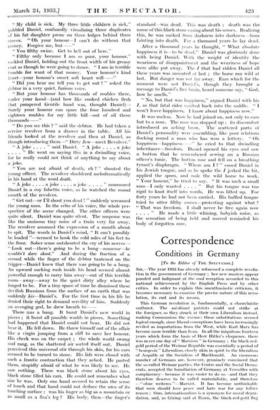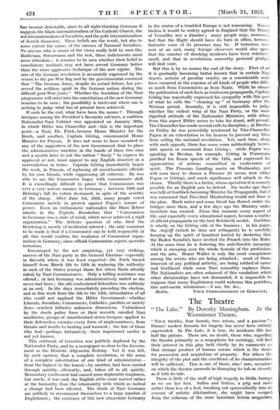Correspondence
Conditions in Germany
[To the Editor of THE SPECTATOR.] STR,--The year 1933 has already witnessed a complete revolu- tion in the government of Germany ; her new masters appear puzzled and indignant at the cool reception accorded to this national achievement by the English Press and by other critics. In order to explain this unenthusiastic criticism, it becomes necessary to examine the precise nature of this revo- lution, its end and its means.
This German revolution is, fundamentally, a chauvinistic outburst. The soi-disant patriots could not strike at the foreigner, so they struck at their own Liberalism instead, making Communism the excuse : these substitutions seemed logical enough, since liberal conceptions have been increasingly reviled as importations from the West, while Karl Marx has become more terrible than Ivan. In all the iniquitous fourteen years which form the basis of Herr Hitler's eloquence, there was never one day of" Marxism " in Germany ; the black-red- gold period of the Weimar Republic was essentially a period of "bourgeois" Liberalism, closely akin in spirit to the liberalism of Asquith or the Socialism of MacDonald. An enormous number of Germans are, however, genuinely convinced that the so-called Weimar parties, the Centre and the Social Demo- crats, accepted the humiliation of Germany at Versailles with • complacency—because it was easier to do so—and find they therefore deserve to be called materialistic, and therefore —"ohne weiteres "—Marxist. It has become unthinkable that men should love peace and hate war for any loftier reason ; thus, internationalism is a synonym for moral degra- dation, and, as Goring said at Essen, the black-re&gold flag
has become detestable, since to all right-thinking Germans it suggests the black internationalism of the Catholic Church, the red internationalism of Socialists, and the gold internationalism
of Jewish financiers. These beliefs are the result, but also to some extent the cause, of the success of National Socialism.
To anyone who is aware of the views really held by men like Rathenau, Stresemann and the rest, these indictments must seem ridiculous ; it remains to be seen whether their belief in conciliatory methods may not have served Germany better than the more aggressive technique of the new regime. The aim of the German revolution is accurately expressed by the return to the pre-War flag and by the governmental comment that "The German Army, despite its actual fetters, has pre- served the military spirit in the German nation during the difficult post-War years." Whether the Socialism of the Nazi programme will enter into the constitution of the new Germany remains to be seen ; the possibility is irrelevant where one is seeking to judge what has at present been achieved.
If such be the end, what have been the means ? Through intrigues among the President's favourite advisers, a coalition Nationalist-Nazi Cabinet was appointed on January 30th, in which Hitler was Chancellor and—this is the important point—a Nazi, Dr. Frick, became Home Minister for the Reich, and another, Captain Goring, cormnissarial Home Minister for Prussia. It does not seem to have occurred to any of the supporters of the new Govermnent that to place the administrative machine in the hands of these two men and a month later to ask the nation " freely " to express its approval or not, must appear to any English observer as a contradiction in terms. Captain GOring immediately began the work, in Prussia, of replacing all unenthusiastic officials by his own friends, while suppressing all criticism. He was able to use the Communist bogey with consunrunate skill. It is exceedingly difficult to prove that Communism was ever a very serious menace in Germany ; between 1930 and Briining's fall its voters decreased, in spite of the severity • of the slump. After June 1st, 1932, many people voted Communist merely in protest against Papen's seizure of power. Even an enthusiastic nationalist like Hans Zehrer admits in the Tligliche Rundschau that "Communism in Germany was a state of mind, which never achieved a rigid organization." The delicate question of who fired the Reichstag is merely of incidental interest ; the only comment to be made is that if a Communist can be held responsible at all, this would confirm the weakness of Communist organ- ization in Germany, since official Communism rejects sporadic terrorism.
Encouraged by the not surprising, yet very striking, success of the Nazi party in the General Election—especially in Bavaria where it was least expected—Dr. Frick busied himself from March 5th to 12th in replacing the authority in each of the States (except those few where Nazis already ruled) by Nazi Commissioners. Only a trifling resistance was offered ; at last Germany was administratively united as she never had been ; the old confessional federalism was suddenly at an end. In the days immediately preceding the election, and in this week from the 5th to the 12th, intimidation of all who could not applaud the Hitler Government—whether Liberals, Socialists, Communists, Catholics, pacifists or merely Jews—reached hitherto unknown dimensions. Unhindered by the docile police force or their recently enrolled Nazi auxiliaries, groups of unauthorized storm troopers applied to their defenceless enemies every form of unpleasantness, from threats and insults to beating and torment ; the fate of those who had—perhaps fortunately—been imprisoned earlier is not yet known.
This outbreak of terrorism was publicly deplored by the Nationalist Party, and by a newspaper so close to the Govern- ment as the Deutsche Allgemeine Zeitung. Yet it was felt, by such opinion, that a complete revolution, in the sense of a complete substitution of one kind of administrator— from the highest to the lowest—by another, had been carried through quickly, efficiently, and, taken all in all, quietly. Momentary excitement had caused some deplorable roughness, but surely, it was said, the English critic must marvel rather at the humanity than the inhumanity with which so radical a change had been effected. The ideals of Nazi Germany are unlikely to recommend themselves to a large number of Englishmen ; the existence of this new chauvinist Germany
in the centre of a troubled Europe is not reassuring. Never- theless it would be widely agreed in England that the Treaty of Versailles was a disaster ; many people may, moreover, feel that the Right should have its turn in office, however fantastic some of its premises may be. If terrorism were now at an end, many foreign observers would also agree that the number of shocking incidents have been relatively small, and that in revolutions unworthy personal grudge's will find vent.
But this is by no means the end of the story. First of all it is gradually becoming better known that in certain Nazi depots, actions of peculiar cruelty on a considerable scale have occurred at the expense of all kinds of people who differ as much from Communists as from Nazis. While he abuses the publication of such facts as traitorous propaganda, Captain Goring has repeatedly expressed his sympathy with this part of what he calls the "cleaning up" of Germany after the Weimar period. Secondly, it is still impossible to judge whether the violent wing of the Nazi Party, or the more dignified attitude of the Nationalist Ministers, with whom from this aspect Hitler seems to take his stand, will prevail. The Chancellor has made several calls to discipline ; at Breslau on Friday he was powerfully reinforced by Vice-Chancellor Papen in an exhortation to his hearers to prevent any blots from soiling the national revolution. Yet, each time, along with such appeals, there has come some unblushingly terror- istic speech or command from Goring; while Papen was • speaking in Breslau, for example, Goring in Pomerania justified his Essen speech of the 12th, and expressed his appreciation of actions committed in exuberance of spirit. The Prussian Landtag meets on Wednesday, and will soon have to choose a Premier (it seems now either Papen or Goring), and much significance will attach to the choice. Thirdly there is a factor, whose operation it is scarcely possible for an English pen to defend. Six weeks ago there was talk of Goebbels becoming Minister for Propaganda, but it was rumoured that President Hindenburg would not hear of the plan. Much water and some blood has flowed under the bridges since then, and a few days ago the Ministry under Goebbels was created. From this moment every aspect of life, and especially every educational aspect, became a matter of official propaganda on the best Bolshevik model. Goebbels is wholly on the Goring side of the business ; in his paper, the Angnff (which he does not relinquish) he is carefully keeping up the spirit of fanatical hatred by declaring that the Baden Socialists have invited the French into the Ruhr. At the same time he is fostering the anti-Semitic campaign which is sweeping over the whole domain of the professions and the arts. Bruno Walter is only the most conspicuous among the artists who are being attacked ; most of them, innocent of any political activity, are being robbed of career and livelihood while some Nazi nonentity replaces them. The Nationalists are often ashamed of this vandalism which other dictatorships have not demanded; it is impossible to suppose that many Englishmen could welcome this pointless, this anti-social, intolerance.—I am, Sir, tic., • Berlin. YOUR CORRESPONDENT IN GERMANY.







































 Previous page
Previous page